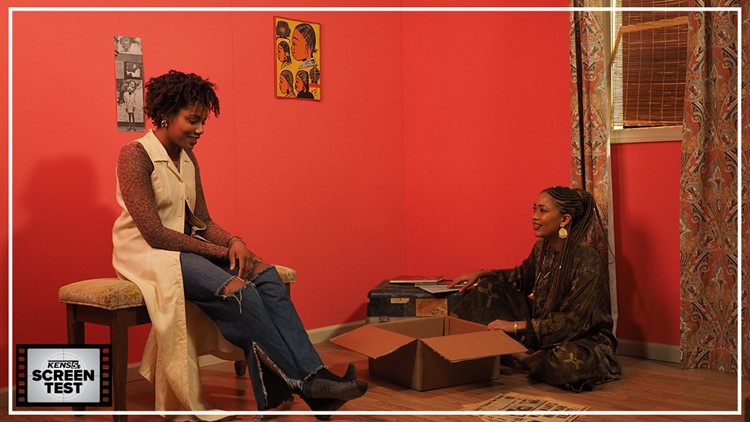In filmmaker Ephraim Asili’s “The Inheritance,” the path to revolution begins with the smallest of acts. The opening of a chest or the flipping through pages of a book, for instance. For Julian, the closest thing this dynamic and un-pindownable movie has to a protagonist, that curiosity begets newfound purpose. It’s a sense of curiosity, too, that drives Asili’s work and beckons us into its infinite cultural, political and historical folds.
Asili’s multipronged feature directorial debut concerns one of the medium’s favorite dramatic hooks: The coming-together of a group of people varied in personal interests, preferences and experiences working around their differences toward a similar goal. For the Black members of the House of Ubuntu – a Philadelphia-based space turned by Julian (Eric Lockley) and his partner, Gwen (Nozipho Mclean), into a hub for education following his grandmother’s death – the goal is implied in the various items left to his possession; literature on Malcom X, recorded speech by Angela Davis, collected poems by Toni Morrison. It’s a space of inherited things that will become a space of inherited passions, but Asili doesn’t wear his movie down with the logistical details of that evolution so much as he charts the emotional investment of the subcommunity we observe cooking, playing music, feuding, living and learning within its brightly colored walls.
For the audience being invited into it, the space at the physical and spiritual center of "The Inheritance" feels somewhat suspended in time. Asili dispenses of any temptation of narrative urgency in favor of documentary-like vignettes that can shake off one aesthetic for another in any given moment—we observe black-and-white archival footage of Black activists, vibrant drawn-out environmental shots, prolonged exposure to one of this ensemble’s many relatively unknown actors pacing through the frame while reading aloud the virtues of African socialism. The fluidity of it all may seem a bit random at the start, but to settle into its cinematic intonations is to settle into a satisfying rhythm of blossoming enlightenment. It’s the sensation of curiosity, made cinematic. From the way it’s shot (beautifully) to the way it’s structured (entirely unexpectedly), “The Inheritance” is the work of a filmmaker refusing to conform to moviemaking norms. Its story really isn’t a story so much as an act of sociopolitical cartography, of connecting the dots between what was, what is and what may be as it concerns Black life.
The movie is robust in that regard, and convincing in how it weaves together ostensibly disparate threads. A moment of brief tension finds Julian at odds with a longtime friend over the collective’s foundational principles before “The Inheritance” shifts into a scene where a young woman discusses her background to someone off-camera as if this were pure nonfiction; that then bleeds into a shot of two men we swore we haven’t been introduced to yet playing music in a corner, and the movie then morphs into Rich directly addressing the camera as he repeats a monologue while throwing himself into it more and more each time.
There’s little in the way of guiding context to these transitions, and this only helps shape the movie’s kaleidoscopic ethos. That’s bound to irk some viewers as much as it will entrance others. By the time we arrive at a simple scene of a woman staged in the center of the frame while flipping through a book as the notes of a trumpet sift in from another room, “The Inheritance” has taken on the magnitude of life itself, which is impressive given we rarely glimpse what’s outside the House of Ubuntu itself. As Gwen puts it: “Truth is the final reality.” And the reality Asili creates here feels legitimate, free from the burden of Hollywood fabrication or glamour. Though it doesn’t entirely free itself from the burden of reckoning; a lengthy section in the middle of the movie explores the history of a horrific real-life police bombing of a Black Philadelphia activist group’s headquarters in 1985, which killed 11 of 13 people who were inside. If we view “The Inheritance” as a diorama, these segments are applied with an extra layer of adhesive, providing pensive thematic counterbalance to scenes of exuberant celebration.
The members of this fictional collective never face direct violent threat, nor do any of them ever suggest violence. But there is a curious juxtaposition between the collective’s meetings brainstorming a community block party – the closest thing Asili’s boundless motivations provide to a contained dramatic arc – and consistent imagery of Black families armed in their homes. Is Asili emphasizing the threat of racism that remain on Philadelphia’s streets, merely referring again to history…or perhaps both? It’s one of the movie’s many stylistic membranes that demand repeat viewings to further parse; thankfully, “The Inheritance” is a 100-minute experience that I can see myself easily slipping back into for a repeat viewing. Its formlessness is borderline intoxicating. In watching the film, we find ourselves occupying a peculiar space between truth-seeking and truth-telling, in a way that sharpens its ideas at the same time as they’re being broadened.
"The Inheritance" is not rated. It begins screening in virtual cinemas Friday, via Grasshopper Films.
Starring: Eric Lockley, Nozipho Mclean, Aurielle Akerele, Chris Jarell
Directed by Ephraim Asili
2021
MORE REVIEWS:
- 'The Father' Review: A shape-shifting dementia drama is elevated by one of Anthony Hopkins's best performances
- 'Boogie' Review: An Asian-American hoopster looks for his big shot in Eddie Huang's new drama
- ‘Land’ Review: Robin Wright the director lets down Robin Wright the actor
- ‘Raya and the Last Dragon’ Review: Disney Animation's latest is a dazzling, thoughtful adventure
- ‘Tom and Jerry’ Review: A bare minimum, barely reached
- ‘Cherry’ Review: The Russo Bros. trade MCU superheroism for gritty superficiality
- ‘Nomadland’ Review: Frances McDormand ventures west in a lament and tender celebration of America’s final frontiers



